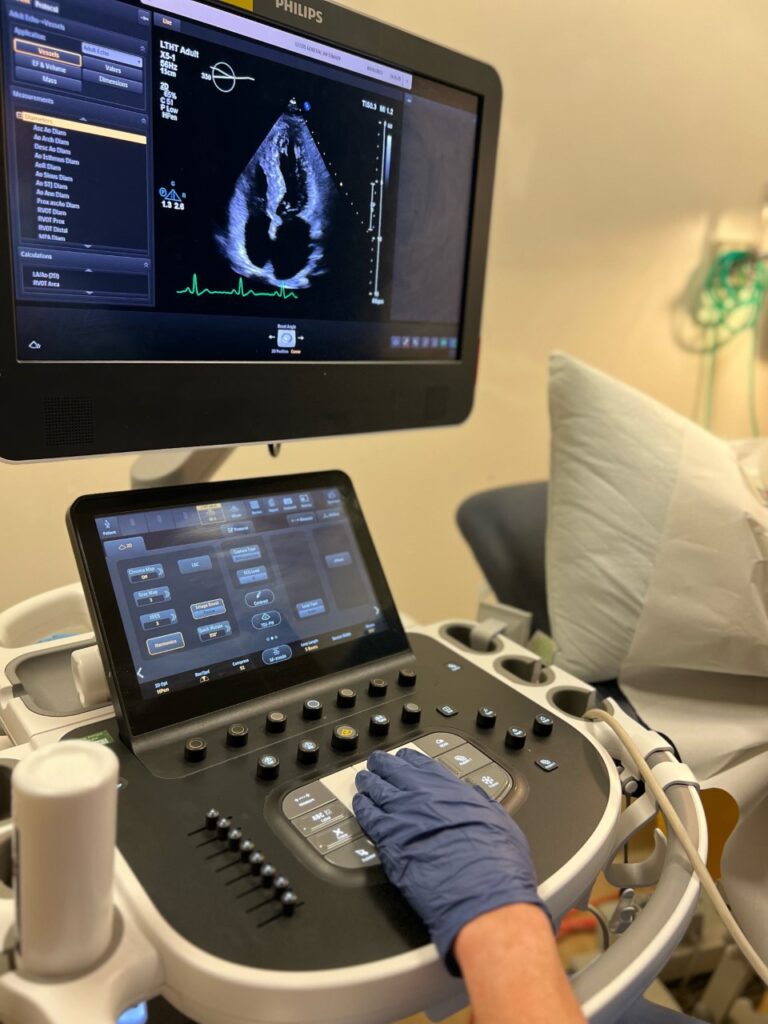
This leaflet explains what to expect when you come to hospital for a Cardiac Ultrasound which is sometimes called an Echocardiogram or Echo. We hope it will answer some of the questions that you or those who care for you may have.
What is a contrast echocardiogram?
A contrast echocardiogram (echo) is a painless test which uses ultrasound and contrast fluid containing micro bubbles to assess the structure and function of the heart.
Why am I having a contrast echocardiogram?
A contrast echo allows us to provide your doctor with detailed information about your heart function. The contrast is used to see your heart more clearly and assess the function. This is used when normal echo images do not give enough information to show how strong your heart is and to look for blood clots in your heart.
What does a contrast echocardiogram involve?
The test will usually be performed by a healthcare professional that is trained as a sonographer; they have specialist training in echocardiography. It will take place in a darkened, private room and you will be asked to remove all clothing from the waist up and wear a gown with the opening at the front.
This procedure is performed by male and female sonographers so please let us know in advance if you require a chaperone.
A small plastic tube called a cannula will be inserted into a vein in your arm so that the ultrasound contrast can be injected. You should not feel any adverse effects from the contrast, however some people may have a reaction, the risks and complications will be fully explained to you before the test. The tube will be removed before you leave the department.
ECG (Electrocardiogram) stickers will be applied to your chest and attached to wires to allow your heart rate and rhythm to be monitored during the scan.
You will then be asked to lie on your left side on a scanning couch and a small amount of ultrasound gel will be firstly applied to the centre of your chest; the ultrasound probe will then be moved into different positions, beneath the left breast area, under your rib cage and on the base of your neck. This allows images of your heart to be obtained from different angles. Some images will be taken whilst the contrast is being injected into a vein; it travels through the right side of the heart, through to the left side and the bubbles are eventually destroyed by the body. It is in the body for no more than a few minutes.
You will hear sounds coming from the echo machine during the scan and this is nothing to worry about ñ it is the sound of blood moving through your heart. Your test may be carried out by a trainee cardiac physiologist or cardiology registrar (under supervision from a senior sonographer who may come in at the end of the scan and review the images before you leave).
The test will take approximately 30-40 minutes to perform.
Are there any risks to the scan?
Ultrasound is considered a safe test. You will have opportunity to discuss any concerns with your Physiologist and Nurse on the day, prior to your scan.
Are there any precautions I need to take before the scan?
No, you can eat, drink, and take prescribed medication as normal before the test.
What happens after my scan?
A report will be written by the sonographer after the scan and will be sent on to the doctor that referred you for the test. The doctor will then be in touch with the results or will discuss them with you at your next appointment. There are no limitations to what you can do after the scan you can carry on as normal.
Can I get an Interpreter?
If English is not your first language we will need to know at least 72 hours before your appointment so that we can book an appropriate Interpreter. We do not allow family or friends to act as an Interpreter.
What happens if I am late or fail to attend my appointment?
If you are late for your appointment you may not be seen, if you think you are going to be late you should contact the department to confirm if you will be seen or not. If you fail to attend you will not automatically receive another appointment. Your referral will be returned to the Doctor who requested the test.
If you need to change your appointment
If you need to cancel or reschedule your appointment please contact the department on these numbers:
Leeds General Infirmary
0113 392 2569
St James Hospital, Seacroft Hospital and Wharfedale Hospital
0113 206 5930 or 0113 206 4759
For more information about outpatient appointments at The Leeds Teaching Hospitals NHS Trust hold your smartphone camera over the QR code and follow the link.
Speech, reading and translation support tools are available on this link.